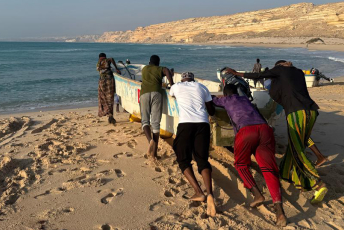Donkeys that are so valuable to West African communities are increasingly falling prey to transnational organised criminal groups, who take advantage of weak regulation, and profit from the ready supply across West Africa and continual demand from Asia.
This trafficking is driven by a growing demand in Asia, especially China, where donkey skin is believed to have sought-after benefits. Gelatine, also called donkey-hide glue or ejiao, is extracted from the skin and used for traditional medicine and other products. It is used as an aphrodisiac, an ingredient in cosmetics, and for curing ailments such as anaemia, dry cough, chronic fatigue and symptoms of menopause.
China’s domestic donkey population has dropped sharply in the past 3 decades, from 11 million in the 1990s to six million in 2013. However, with the Chinese using over four million donkey skins a year for various products, demand remains high.
And so Chinese traders have turned to Africa to meet this demand. In Niger, donkey numbers have fallen dramatically as a result. With exports of skins increasing from 27 000 to 80 000 between April 2015 and October 2016, and the average price of a donkey increasing from €29 in 2012 to €122 in 2016, there are fears that they might eventually disappear from the country.
In Mali, a Chinese company is reportedly slaughtering 300 donkeys daily and exporting their skins to China. In Burkina Faso, around 19 tonnes of skin were exported to China between October 2015 and January 2016.
Donkeys are killed in cruel ways, often with a hammer or a dagger. Social media platforms provide traders with anonymity and secure communication channels that connect buyers with traffickers.
According to Simon Pope, tactical response lead at The Donkey Sanctuary in the United Kingdom, ‘Donkey skin trafficking in West Africa has large regional ramifications in which Ghana plays a key role. Donkeys can be transported from as far as North Africa, Chad and Cameroon, through Burkina Faso, where a large market exists.’
‘From there, donkeys are transported to Ghana where they are slaughtered – it is estimated that 100 000 donkeys are slaughtered there every year – and their skins exported to China and Hong Kong.’
While ‘two years ago, a donkey would be sold for $20 and its skin bought for $150 in West Africa, the price of the skin has rocketed to $800 in China.’
Pope says Benin appears to have either acted, or been appropriated, as a laundering station for donkey skins from Brazil, which has a ban in place. Between 2018 and 2019, several containers with salted donkey skins were shipped from Salvador to Tchongpei, a Benin-based agro-supply company. Tchongpei is registered on the Chinese customs database as an exporter of animal skins and claims to have a maximum processing capacity of 300 000 donkey skins annually.
Pope told ENACT that between March 2019 and June 2020, Tchongpei made several shipments of ‘animal blood, dead animals and inedible meat’ to a company in China. This is despite a 2016 edict by the Economic Community of West African States (ECOWAS) that member countries should not slaughter or export donkeys for trade. There seem to be legal loopholes in this edict.
In September 2016, the heads of veterinary services from all ECOWAS member states signed a memorandum of understanding (MoU) restricting the trade in donkey skins. It specifically prohibits all veterinary officers in West Africa from issuing permits for the movement or slaughter of donkeys and export of donkey products. However as the MoU is not legislation, it is not enforceable. Consequently, donkey meat can be seized but those who violate the ban cannot be prosecuted.
Countries like Niger and Burkina Faso have forbidden the slaughter of donkeys as well as the export of the animal, its meat and skin. But this isn’t enough to stop their trafficking in West Africa generally.
For Pope, ‘While some West African countries such as Senegal have taken some measures to curb the trafficking of donkeys, Ghana remains silent. While on paper Accra has put in place some law enforcement, this is never applied … There are just a handful of records of donkey skin and meat exports from Ghana to China, the most recent in 2021.’
Because donkeys in West Africa have many different functions, this mass killing has dramatic societal consequences. Donkeys are a source of income, a means of transport for people and goods in rural and urban areas, and women often rely on them for tasks such as collecting water and other goods. Without donkeys, children often miss school as they need to help their parents with domestic chores. With the loss of income from donkeys, many parents cannot afford to pay their children’s school fees.
The trade can also spread disease. The unregulated movement of donkeys for their skins is reportedly responsible for an illness that resembles equine influenza.
A lot needs to be done to turn this growing tide. West African populations need to be made aware of these negative social and economic consequences. Local CSOs are well positioned to raise awareness of the dangers of donkey trafficking and lobby their respective governments to ban the import of ejiao.
On the demand side, raising awareness among ejiao consumers is equally important, to inform them of the ethics of their actions. In addition, laboratory-grown ‘humane’ donkey collagen can be more widely manufactured and sold. Early market research shows about 60% of ejiao users would be willing to try this product. Although the technology has already been developed, the market remains untapped.
Greater regional acknowledgment of the negative consequences of this illegal trade may strengthen the application and enforcement of trading legislation and bans the donkey skin trade entirely. While consistently applied surveillance measures along common borders to intercept illegally traded donkey skins is also vital.
Abdelkader Abderrahmane, Senior Researcher, West Africa Regional Organised Crime Observatory, ENACT project, ISS Regional Office for West Africa, the Sahel and the Lake Chad Basin







